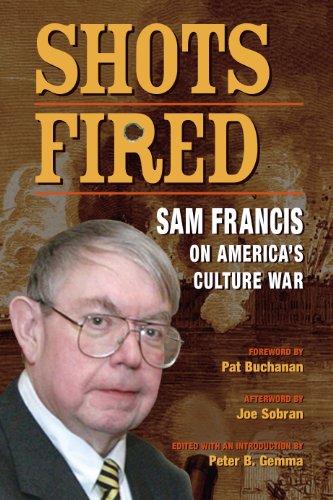


By Tom Piatak
02/08/2007

Recently by Tom Piatak: Diversity Is Strength! It’s Also…War Against Christmas
(Peter Brimelow will be speaking at a March 20 conference in Washington D.C. to mark the publication of Shots Fired: Sam Francis on America’s Culture War, a collection of the writings of our much-missed columnist. Details here.)
Shots Fired: Sam Francis on America’s Culture War, the new collection of columns and essays by Sam Francis, reminds us how much we miss Sam Francis, his masterful prose and matchless analysis.
One of the essays, Sam’s tribute to University of Dallas historian Mel Bradford, is equally applicable to Sam. Sam noted that Bradford did not fit into Washington, a city "where appearance prevails over substance, where success often depends on forgetting as soon as possible the people and values that got you here in the first place". Sam described Bradford’s love of the past, and noted that "without consciousness of the past, without remembering who we are, we virtually cease to be human." Finally, Sam praised Bradford as "a highly serious man who combined the seriousness of the scholar and thinker with the good humor of one who recognizes and comes to be comfortable with his own mortality."
All of these qualities — a preference for substance over style, loyalty to his people and their values, a reverence for the Western tradition, and seriousness leavened with humor — are on display in the essays collected here.
Of course, Sam’s sense of humor was not always genial. This collection contains many examples of his dry, even acerbic wit. Sam seemed to have particular fun in an essay first published in The American Conservative, which mocked the pretensions of Norman Podhoretz and the "gemlike sycophancy" Podhoretz had garnered from the likes of Paul Johnson and William F. Buckley, Jr. — who gushed that "Never (that I know) has a single lifetime borne such literary and philosophical fruit." As Sam noted, Buckley’s burbling "places Podhoretz somewhat higher than such dimmer bulbs as Shakespeare, Dante, and Goethe". After wading through yet more hosannas to Podhoretz, Sam observed, "By this time the reader is fully expecting to find illustrations of Norman Podhoretz swimming the Yangtze River". [Idol With Clay Feet, June 7, 2004]
The Maoist reference — redolent of personality cults, fantastical ideology, and "re-education" for those who persist in believing as they always have — is apt. The late, great American "Conservative Movement" had no keener observer during his life than Sam Francis. He noted carefully the damage done to conservatism by the epicene Buckley — his endless quest to make conservatism acceptable to liberals, and his "gemlike sycophancy" toward Podhoretz and the leftists who gathered around him. As Sam wrote, the result of Buckley’s efforts "was a movement all right — of apparatchiks, enlivened by the occasional con artist and outright crook", with "[t]he high heroism of the Odyssey, the Crusades, the Conquistadores, the pioneers of the American Frontier devolved into sending more money to Jonas Savimbi and Ariel Sharon."
As for Podhoretz and his followers, Sam saw that the effect of neoconservatism is "the preservation and continuing hegemony of the liberal regime and its ideology". Its "whole function has been to undermine and cripple any healthy conservative tendency to challenge the dominance of the left and the truly rotten culture it dictates". The neocons have consistently been more bitter in their attacks on those on their right than those on the left, since the latter are seen as wayward cousins while the former are viewed as dangerous "fascists", a leftist cussword the neocons tellingly employ with great regularity.
Sam’s critique of the American Conservative Movement was not limited to the fact that its leaders were often feckless or venal, and allowed their movement to be transformed by the neoconservatives. Even when the Movement still stood for some things worth conserving, it misread the nature of American society. Edmund Burke is an important and inspirational figure, but his ideas have limited applicability in contemporary America. "The basic flaw of the Burkean model is that we no longer live in the 18th Century, when a relatively conservative aristocracy prevailed." Instead, in our day, "the people and forces now in power in this country — in government, the culture, and Big Business — are the enemies of the real America and the real civilization of the West".
Deference to elites in our age can only lead to a continued leftward drift in politics and culture.
For a time, Sam hoped that he had found the force to challenge these elites — in what he called the "Middle American Radicals" who represented "both the central base of the American Right as well as the core or nucleus of American culture and the American nation". Unfortunately, this force proved all too susceptible to the danger posed by a "counterfeit leadership" intent on "co-opting the authentic populism of the Right that today is the only remaining oppositional force in American politics". Middle Class Americans who are seeing "their material wealth, their communities, their nation, their people, and their civilization vanishing before their eyes" do indeed have cause to be angry. But much of that anger is focused on phony controversies promoted by what can now be called the neoconservative wing of the Mainstream Media, such as Fox News.
The first of these phony controversies were the scandals that swirled around Bill Clinton. Sam was no apologist for Clinton, whom he described as "one of the most repulsive men in American political history, mottled with the gangrene of corruption and sexual license and emitting a stench of tyranny". But he recognized, as virtually no one else on the right did, that an obsession with Clinton would not help advance serious conservatism, no matter how beneficial it might prove to Beltway hacks who penned one lurid exposé of Clinton after another. (Indeed, such tomes were still being produced long after Clinton had left the White House).
As Sam wrote at the end of Clinton’s presidency:
"The conservatism invoked by Barry Goldwater, Ronald Reagan, Jesse Helms, and Pat Buchanan has largely vanished. Budget-bickering, obsession with Bill Clinton and his scandals, and various conspiracy theories about them replaced serious conservative politics."
A prime problem with the obsession with Clinton is that it led directly to George W. Bush. Bush generated enormous support in 2000 from Middle American Radicals and movement conservatives alike, simply because many believed that he could defeat Clintonism (in the person of Al Gore) and no one believed that he would solicit sex from interns in the Oval Office. Bush’s mandate thus had nothing to do with advancing conservatism — something that had never before interested him — but in avoiding the sort of disgraceful behavior that had characterized Clinton’s tenure in the White House. In this, Bush has succeeded.
In almost every other way that a serious conservative would assess Bush, however, he has failed. As Sam wrote of an article lauding Bush’s "conservative" accomplishments, "the impact of Mr. Bush on American conservatism has been a disaster. It has been a disaster because every 'contribution' the authors [John Micklethwait and Adrian Wooldridge] cite is … an abandonment of what traditional conservatism means and has meant. It is, in short, neo-conservatism."
Bush’s embrace of neoconservatism is evident, of course, in the centerpiece of his administration, the Iraq War. This war was justified by Wilsonian and universalistic arguments, leading Bush to advocate fighting "tyranny" and spreading "democracy" throughout the entire world.
Bush’s endorsement of such messianic nonsense cannot be called conservative. It marks a radical departure from the actual views of the Founders who doubted that most peoples "were capable of stable and free republican government" of the type envisioned in the Constitution.
The results in Iraq so far do little to suggest that Sam was wrong either in his opposition to the war or in his warnings over the years about the dangers posed by neoconservatism.
The same sort of leftist arguments are used to justify many of the Bush Administration’s policies, including its globalist program of free trade, its vast expansion of the size and scope of the federal government, and its unwavering support for a guest-worker/amnesty bill that would radically transform America by bringing 60 million new immigrants to the United States over the next decade. Sam quipped in 1991 that "[t]he doctrine of equality is unimportant because no one, save perhaps Pol Pot and Ben Wattenberg, really believes in it." (First published in Equality as a Political Weapon, Essays in Political Economy 10 (July 1991): 2) Unfortunately, we now appear to have as President one of the true believers, with all sorts of budding new egalitarians on the right, thanks to the dolorous combination of neoconservatism and hero-worship of Bush that has increasingly characterized Establishment conservatism since 2000.
Nor does the future appear noticeably brighter, despite recent, opportunistic disavowals of Bush by both neoconservatives and others in the conservative Establishment. (See Cakewalk Crowd Abandons Bush by Pat Buchanan, and Buckley: Bush Not A True Conservative, CBS News, July 22, 2006).
At the moment, the leading contenders for the GOP Presidential nomination appear to be John McCain, Rudy Giuliani, and Mitt Romney, none of whom is a conservative and each of whom has voiced support for the sort of nation-busting guest worker/amnesty bill that McCain co-sponsored in the Senate. Yet they may well, if nominated, garner the support of most Americans on the right, especially if a member of the hated Clinton clan is the Democratic nominee.
This does not bode well for genuine conservatism. As Sam wrote: "The argument that we just have to support the lesser of two evils to avoid destruction is merely a formula by which evil is perpetuated and men and measures that are not evil and driven into perpetual exile."
But even if it does not appear at the moment that the Middle American Radicals are about to charge over the hill to the rescue, like the 7th cavalry, there is no reason to give up the fight. The issues Sam identified as important — opposing the dispossession of the middle class and "dismantling the warfare-welfare state, controlling immigration, reversing the erosion of national sovereignty, withdrawing from the pursuit of a globalist-imperialist foreign policy, and restoring a Eurocentric cultural order" — are real and important. Because of their importance, these issues will endure.
And one day, if we are lucky, attract a political champion on a par with their intellectual champion, Sam Francis.
By Tom Piatak writes from Cleveland, Ohio.